A glimpse into the business world intrigued University of Wisconsin Oshkosh student Tea Harris, of Hortonville, during her spring trip to Germany to learn about the culture and history of Berlin and to study at the Viessmann Sustainability Academy.
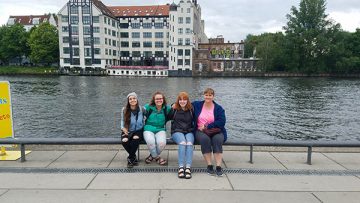 Harris, majoring in environmental studies and German with a minor in sustainability management at UW Oshkosh, said she “absolutely loved” the two-week international program and did not want to come home.
Harris, majoring in environmental studies and German with a minor in sustainability management at UW Oshkosh, said she “absolutely loved” the two-week international program and did not want to come home.
The 2017 trip represents the fifth year of the Viessmann-UW Oshkosh partnership.
“The program provides our students with two international (German) opportunities to learn from an international perspective and gain experiences they would otherwise not be able to get,” said Greg Kleinheinz, professor and Viessmann chair of sustainable technology, noting Viessmann’s financial support allows the experience to be affordable for students.
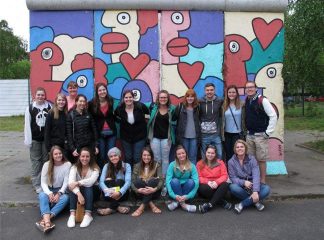 During the first week, students learned about the culture and history of Berlin; the second week had them studying the intersection of business and sustainability at the Viessmann Sustainability Academy at the Viessmann headquarters in Allendorf, Germany. During the trip, about 20 UW Oshkosh students and a number of German students interning at the the Viessmann Group listened jointly to lectures, toured company facilities and worked in small groups on projects related to sustainability.
During the first week, students learned about the culture and history of Berlin; the second week had them studying the intersection of business and sustainability at the Viessmann Sustainability Academy at the Viessmann headquarters in Allendorf, Germany. During the trip, about 20 UW Oshkosh students and a number of German students interning at the the Viessmann Group listened jointly to lectures, toured company facilities and worked in small groups on projects related to sustainability.
Topics focused on Viessmann’s approach to sustainability, Viessmann’s technology and business model, and climate change and renewable energies in Germany, the European Union and the United States. The Viessmann Group is one of the world’s leading manufacturers of efficient, reliable and affordable heating and cooling products and considered a leader in sustainable practices.
“This program is truly unique in this combination of cultural and historical exploration and the opportunity to gain insight into the operation of a German company that is a leader in sustainable practices,” said Monika Hohbein-Deegen, international studies and German associate professor, who accompanied students on the trip.
For the first time this year, the student group, she said, engaged in design thinking, being trained by coaches on the design thinking methodology, in a three-day workshop.
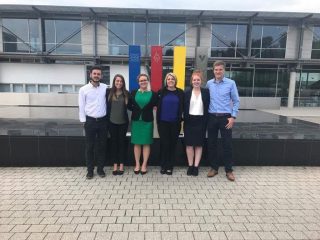 Hohbein-Deegan said the week ended with group presentations to members of the upper management team at Viessmann, as well as to UW Oshkosh faculty leaders and John Koker, dean of the UWO College of Letters and Science, on how digitization can contribute to sustainable practices.
Hohbein-Deegan said the week ended with group presentations to members of the upper management team at Viessmann, as well as to UW Oshkosh faculty leaders and John Koker, dean of the UWO College of Letters and Science, on how digitization can contribute to sustainable practices.
Nathan Stuart, associate accounting professor, said the team project involved working with people from a different country and culture and overcoming a language barrier. Four teams composed of combined UW Oshkosh and German students worked on the sustainability challenge from Viessmann.
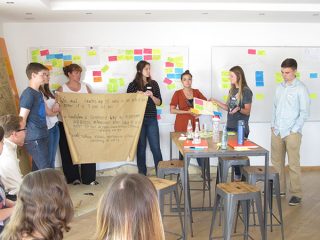
“The teams had to ‘pitch’ their solutions rather than simply presenting them, leading to some creative and interactive communications of ideas,” Stuart said.
For the course, students are given a course grade for the 3-credit hour class based on four components: participation and professionalism in all facets of the course; a presentation of the Viessmann project; cultural reflection paper due after returning to the U.S.; and a business reflection paper also due after return to the U.S.
The UW Oshkosh-Viessmann partnership continued in the U.S., as 20 Viessmann employees attend a four-week leadership development program at UW Oshkosh. The employees are studying on campus through the end of June.
Cultural immersion
Harris said Berlin is a very multicultural city and that her German language skills are better than she believed. She said Viessmann is very “customer-centric company that aims to keep customers first, while always improving.”
“I learned I enjoyed business more than I expected,” Harris said.
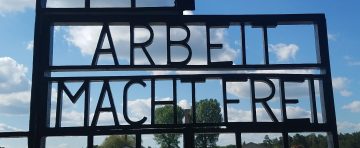
“Arbeit Macht Frei,” a German phrase meaning “work sets you free,” is known for appearing on the entrance of Nazi concentration camps.
She enjoyed the rich history in Berlin and the positive and upbeat environment of Viessmann. She visited places she learned about in textbooks: the Brandenburg Gate, concentration camps, the Bundestag and the Holocaust Memorial.

“It was a whole new experience to actually see these places in person, rather than reading and seeing pictures in class,” she said, adding that she loved working with some younger workers/students.
“Overall I enjoyed my time at Viessmann, meeting new people, creating new friendships, and the new knowledge I took home with me,” she said. “The trip was a 100 percent success.”
Student Jody Kell, of Winchester, who is a first-year student after a 20-year break from school, said the words “sustainability” and “digitalization” were not even scary by the end of the week.
Despite early thoughts she was unqualified for the Viessmann part of the trip, she said there were guided activities to achieve the desired results.
Kell said she was “blown away” by the Berlin part of the trip: learning about the Berlin Wall and what was destroyed to build the wall and what was rebuilt when the wall fell. She visited a Jewish Memorial, a concentration camp and other WWII sites. She has hopes to return to Germany and visit France with her husband.

